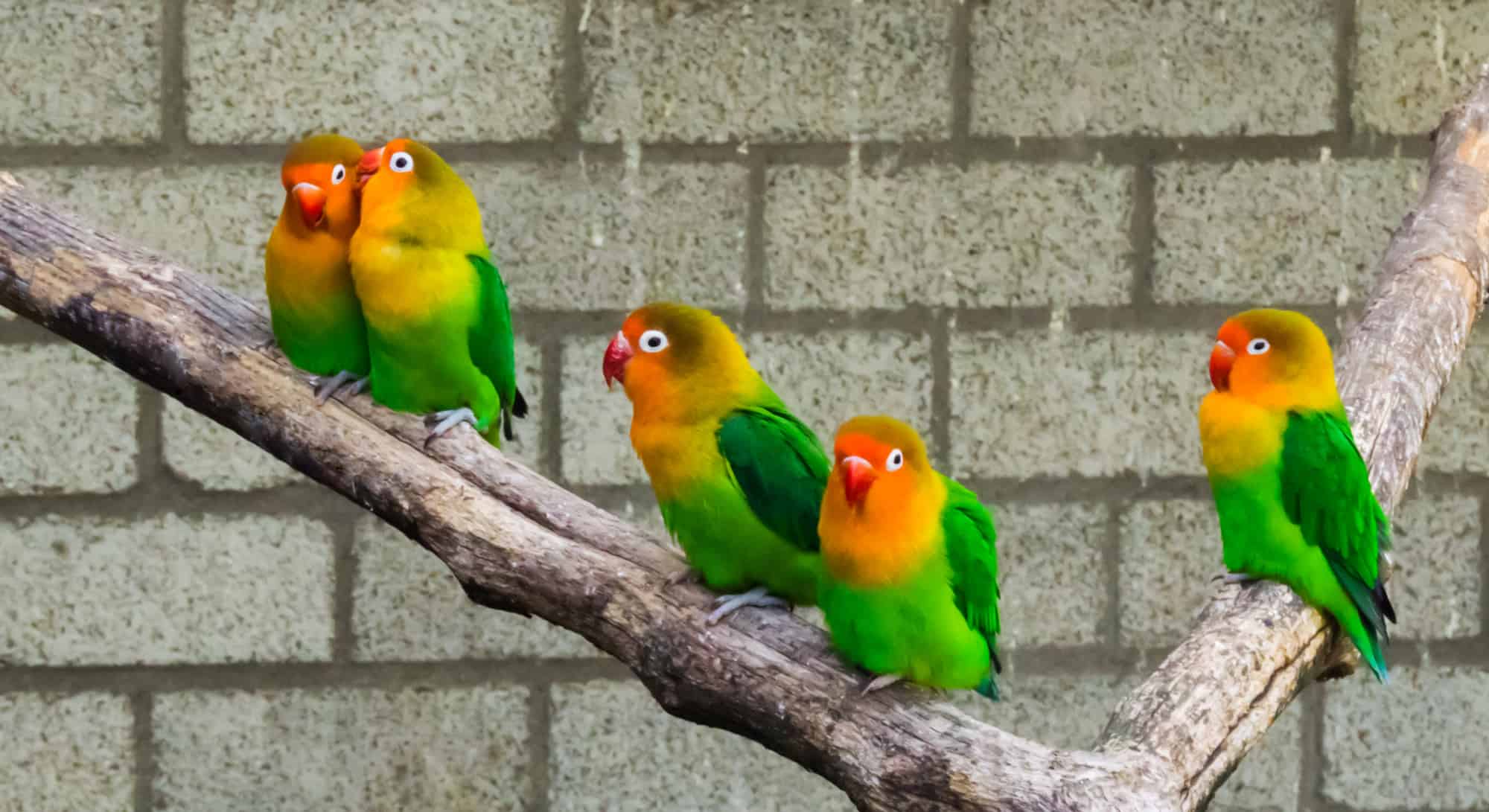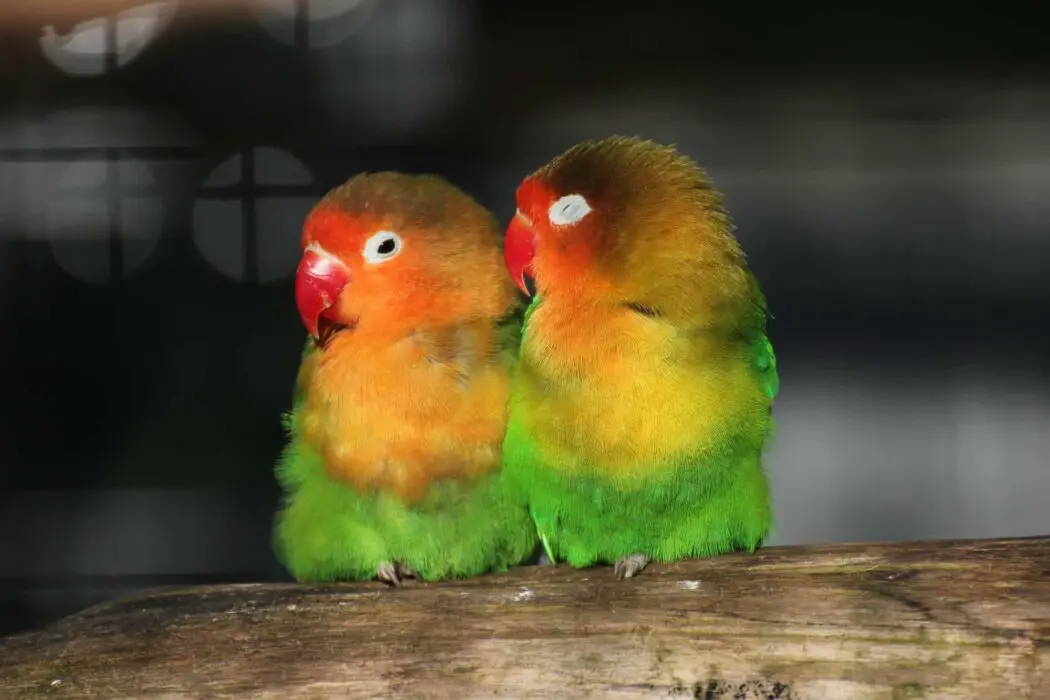Having parrots at my house for the past several years, I got used to the amount of noise they make. So chattering did not bother me. And I was pretty surprised when one friend who visited my house said that birds are boisterous. So I started wondering how much noise is ok for the parrots. Also, I was interested in whether lovebirds make too much noise.
The quick answer to these is yes. Lovebirds make noise. They are clever birds that like socializing, and their chattering is the communication tool they use daily. This noise doesn’t sound oppressive. The only time your lovebird will become noisier is when they are bored.
Lovebirds love to chat and cackle in their shrill voices, whether to one another or just to themselves.
Another type of noise they make is when they are playing with toys and not vocalizing.
However, we should investigate the subtleties of when they are most dynamic and how the commotion of lovebirds analyzes different species.
A Full List of Lovebird Types (With Photo and Video)
Are Lovebirds Noisy During the Day?
Be ready that your lovebird makes a lot of noise in the early morning and late afternoon. Like other birds, lovebirds adore waking up with the song.
The critical thing to know is that lovebirds live in pairs. So, in this case, expect the noise level to be doubled. Again, it’s not a myth but a common practice of breeders.
If your lovebird seems to be noisy all day long, chances are it is bored with the environment and needs some attention or toys to entertain itself. A mirror is an excellent choice here as it can keep your lovebird busy with playing without the need to get a companion for your pet. Another option is toys that can produce sounds, for example, bells or musical toys. In this way, your lovebird will not make noise out of boredom.
Of course, you should spend time interacting with your pet during the day, especially if you have only one lovebird.
Are Lovebirds Noisy at Night?

In the evening, lovebirds usually get ready to sleep. They can make some noise during the preparation. The amount of noise will be similar to those made in the morning.
There can be a problem if you notice that lovebirds make excessive noise at night or even every night.
What can it be? The first thing to consider is simple boredom. If the bird does not have enough stimulation and socializing during the day, it won’t be tired and will have trouble falling asleep. So be sure to keep your lovebird well-occupied during the day.
Another thing to check is the day-night cycle. When you own a parrot, you have to make their environment similar to natural day-night cycles. For example, keep the cage in a place where you will not disturb the bird that is asleep. Disturbing the bird can result in sleep troubles that are difficult to deal with. One of these is excessive singing, for example.
Make sure there is less light in the evening and at night. For example, you can cover the cage with a lovebird, so no light reaches its cage at night and in the evening.
With a healthy regime, lovebirds will have no trouble sleeping at night. They will not make extra noise during the night.
How Often Lovebirds Lay Eggs? Breeder’s Guide
Are They Noisier Than Other Species?
Let’s see how the level of noise that a lovebird creates can be compared to other parrot species. Before we proceed, let’s keep in mind that every parrot from every specie will still have its personal noise levels.
So here is the comparison with other species.
If we compare small parrots, like cockatiels, a lovebird will be way chattier than a cockatiel even though they are smaller than a cockatiel.
So size is one factor that influences the level of noise the parrot can produce. However, in the case of parakeets, who are bigger than cockatiels, they are still quieter than the lovebirds. This is because they don’t chat as much as lovebirds do, and their voices are not that loud.
Lovebirds are very small, and because of this, they are quieter than larger breeds. Let’s compare a cockatoo and a lovebird, and we’ll see that large cockatoos are louder and create a lot more noise.
Similarly, bigger parrots like African greys, conures, macaws, and Eclectus parrots will create more noise than a smaller lovebird. So from this point of view, lovebirds are less noisy than big parrots can be.
However, if you prefer some silence in your house, lovebirds will not fit into that request.
Are Lovebirds Cheap? How Much for a Parrot?
How Can I Keep My Lovebirds Quiet?

There are a few tips on how to make your lovebird quieter if you need it.
As I mentioned, lovebirds are very smart and social pets. Because of this, they need a lot more attention from the owner than other parrot species. So here, the essential point is to make them busy and stimulated during the day. You may spend tons of time playing with your bird daily if you own a single bird. So ensure the cage contains lots of toys, a mirror, and other things, so your lovebird is busy playing.
Also, keep in mind that your lovebird has to have enough sleep during the night, so you will want to avoid any stimulation and interaction in the evening. Follow the natural day-night cycles and regulate the amount of sunlight your parrot gets during the day.
To Sum Up
Indeed, lovebirds are noisy birds. So when you choose to adopt a lovebird, be ready for the specific noise level in your apartment. At the same time, many more parrot species produce a lot more noise.
Lovebirds are lovely and small, but they are full of energy, so don’t be fooled by their size and don’t start thinking they will bring quietness to your home; if you are ready to the keep up with some amount of singing and chirping, then go on and adopt a lovebird. They make good companions and will cheer up your residence.


